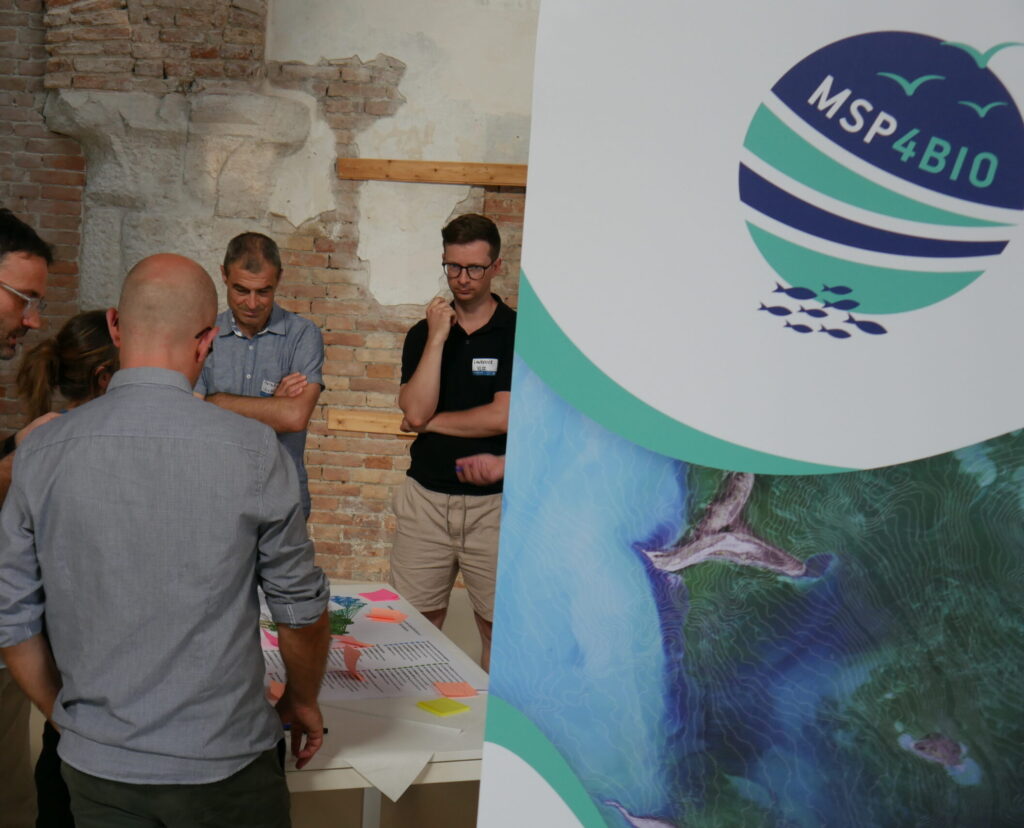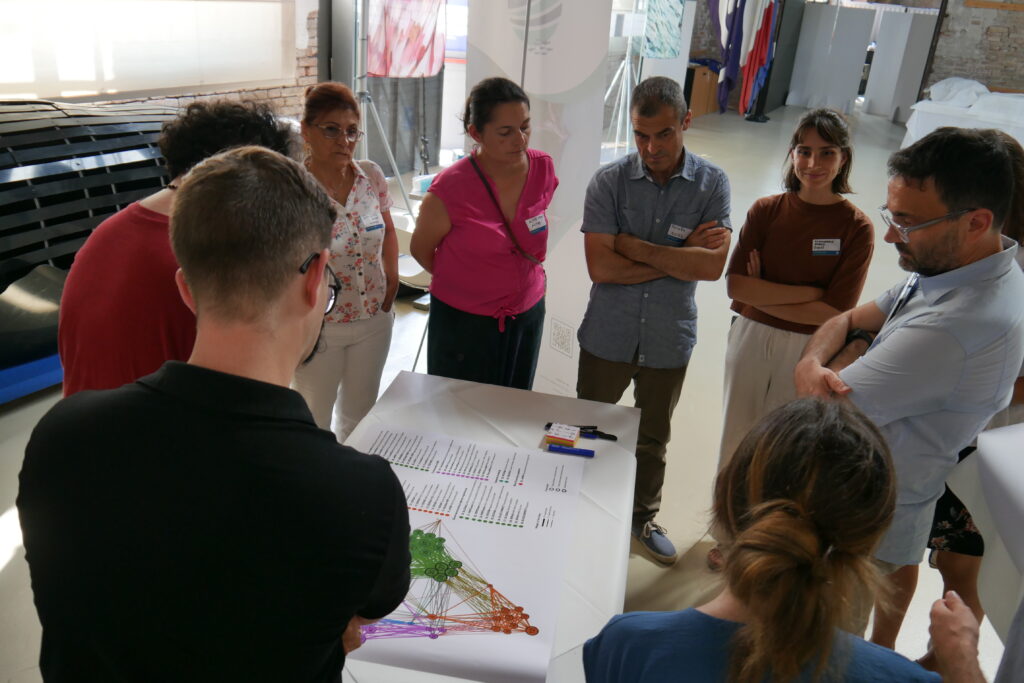Author: Natascha Jaspert – s.Pro, Ivana Stojanovic – s.Pro
Starting the summer season, Venice became the vibrant epicenter for maritime spatial planning (MSP) as MSP4BIO held its Final Event, hosted by CNR-ISMAR. This gathering concluded the highlight of the Blue Week — a lively series of activities that started with the internal MEDIGREEN workshop and continued with the NESB project workshop focused on Maripark scenario building on 02 July.
Over the course of three impactful days, a diverse group of marine experts, including project partners, policymakers, marine planners, MPA managers, and Communities of Practice, convened to share insights and explore how biodiversity can be more effectively integrated into MSP processes.

🤝 Day 1 – Cross-Fertilisation and Knowledge Transfer
The event kicked off with a vibrant exchange among ongoing MPA and MSP projects in Europe. Attendees represented a broad spectrum of institutions and sectors, providing a unique opportunity for cross-fertilisation of ideas and knowledge transfer. Projects pitched during this session included MEDIGREEN, NESB project, BLUE4ALL, MarinePlan, MPA Europe Project, MSP-GREEN, CrossGov and more. This inclusive atmosphere set the tone for a collaborative event by identifying and deepening synergies, building on existing collaboration and exploring future cooperation for the uptake of MSP4BIO results. Most importantly, projects had a final exchange on science-based policy dialogues, discussing MSFD/MSP needs and prioritising joint policy recommendations that are being produced in MSP4BIO’s final steps.
🎯 Day 2 – Validation of MSP4BIO Results and Outcomes
The formal opening of the MSP4BIO Final Event took place on the second day, centering on the validation of key results and outcomes produced by the project. An interactive workshop allowed participants to engage directly with the tools, frameworks, and policy recommendations developed, offering feedback and ensuring that the solutions were robust and fit-for-purpose. This collaborative validation process reinforced the relevance of MSP4BIO‘s contributions to the MSP community.
The MSP4BIO initiative leaves behind a rich legacy of tools, frameworks, and knowledge resources aimed at fostering ecosystem-based marine planning:
- The Ecological-Socio-Economic (ESE) Management Framework offers a comprehensive approach to balancing ecological, social, and economic factors in MSP decisions.
- Modular toolkits have been developed, including the Ecological Toolkit (carrying the guide for climate-smart MPAs), Socio-economic criteria, a practical Trade-off methodology and a guide for Nature-inclusive operations of blue economy sectors to navigate competing interests.
- The project synthesized critical policy barriers in MSP processes, proposing actionable policy coherence solutions to overcome these hurdles.
- Test-site applications demonstrate how the ESE framework can be tailored to local contexts, delivering practical, site-specific solutions.
- A newly curated knowledge database creating a resource hub for ongoing and future initiatives.
- Insights gained through intensive engagement with Communities of Practice highlight the importance of stakeholder involvement for sustainable outcomes.
- And lastly, the Strategic Guidance for integrating Marine Protected Areas (MPA) in MSP which promotes more cohesive management strategies.
- and more to come!


🌟 Day 3 – Creating a Lasting Legacy
The final day focused on forward-looking internal sessions designed to strategize how to capitalise on MSP4BIO‘s outcomes and ensure their effective uptake by policymakers and practitioners. Discussions revolved around embedding project results into ongoing and future initiatives, building on the momentum of Blue Week to foster sustained impact in marine biodiversity conservation and spatial planning.
📚 Lessons Learned: The Path Forward
With this Final Event MSP4BIO was able to confirm its legacy with several initiatives and projects like BLUE CONNECT and BioAgora building on our work. Furthermore, MSP4BIO is expected to contribute to the upcoming revisions of the MSFD and MSPD, announced with the launch of the European Ocean Pact this June.
The event underscored several crucial principles that emerged from MSP4BIO‘s work:
- Strong collaboration across projects is vital to harmonize methodologies and maximize impact.
- Building trust with stakeholders fosters inclusive, transparent, and long-term planning efforts.
- Achieving policy coherence across sectors and jurisdictions is indispensable for meaningful change.
- Embracing ecosystem-based approaches ensures that maritime spatial planning supports both biodiversity conservation and human well-being.
Adding a cultural dimension, the gathering featured the premiere screening of the Cadiz Real Faces documentary, now available on MSP4BIO’s YouTube channel, offering a vivid portrayal of coastal communities and their relationship with the sea.
🚀 Looking Ahead: Consolidating Efforts for Nature-Inclusive MSP
With Blue Week behind us, MSP4BIO is setting its sights on completing joint Policy Recommendations by the end of July. This document will consolidate recommendations from MSP4BIO and its’ sister projects, marking a significant step toward embedding nature-inclusive principles into future MSP policies.
The event’s and project’s success owes much to the dedication of the MSP4BIO consortium, its Advisory Board, Communities of Practice, the Project Officer and the collaborative spirit of sister projects including MEDIGREEN, NESBp, BLUE4ALL, MarinePlan, MPA Europe Project, MSP-GREEN, CrossGov and many more.
As we celebrate this milestone, it’s clear that the future of biodiversity-smart MSP depends on continued partnership, innovation, and shared commitment to safeguarding marine biodiversity through integrated and adaptive planning.


